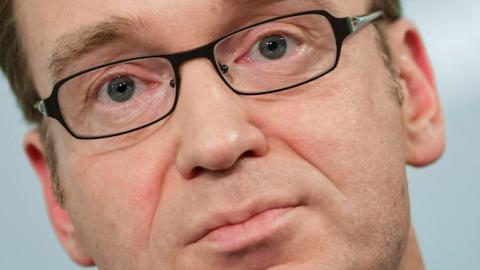The historic opportunity has come and gone.
There was a chance that a powerful alliance could form this spring between Germany’s government and the Bundesbank, powerful enough to begin rolling back the wild monetary experiment run by the Mario Draghi-led European Central Bank (ECB)—with its massive transfer program from Germany to weaker institutions on the continent’s “periphery,” especially Italy. But Bundesbank Chief Jens Weidmann got cold feet, and clearly announced as much in an April 12 interview with the Financial Times: “It’s not unusual for politicians to have opinions on monetary policy, but we are independent. The ECB has to deliver on its price stability mandate and thus an expansionary monetary policy stance is appropriate at this juncture regardless of different views about specific measures.”
In other words, according to Germany’s top central banker, the most important issue currently at stake is not what’s best for the German economy—or for Europe’s, or the world’s—but the preservation of unquestioned independent authority for his own and other central banks. For all practical purposes, German Chancellor Angela Merkel (whom Weidmann previously served as chief economic adviser) happens to agree with him about this, and the two of them have thus sided with Draghi and the ECB against the chorus of German politicians—especially on the Right, like Finance Minister Wolfgang Schäuble—who have been savaging the ECB’s further dive into negative interest rates and massive balance-sheet expansion, which impoverish German savers. Yes, some of this criticism involves a simple political reaction to recent German regional elections, in which Merkel’s Christian Democrats (the CDU) have lost ground to the anti-immigration—and anti-Euro—Alternative für Deuthschland (AFD). But it is serious criticism just the same, and German, European, and global policymakers make light of it at their peril.
Germany’s abdication of monetary power—a slow but inexorable process since the voyage to European Monetary Union (EMU) began in earnest during the late 1980s—is a major source of growing financial instability throughout the world. The hard Deutsche mark (DM) had previously served as a popular and reliable alternative to the US dollar: whenever Washington pursued unstable money policies, the dollar would plunge, the DM would soar, global markets would adjust accordingly, and Washington would eventually be forced into a course-correction reversal. But the no-longer-hard, post-EMU Deutsche mark is obviously useless in such a situation.
And the Euro has obviously failed as a replacement for the old DM. It needn’t necessarily have failed this way. The monetary-related constitutional provisions embodied in the Maastricht Treaty were weak and deeply flawed, but they were there to be used, and might have been—had Berlin chosen to wield its power within the EU on behalf of traditional, stable-money principles. Instead, the German government has consistently surrendered that power; on several key occasions Chancellor Merkel has given Draghi and the ECB a green light simply to ignore the Maastricht monetary constitution, despite clear objections from the Bundesbank. This time, though, there seem to be no objections from the Bundesbank to begin with. Which is a true—and truly ominous—eye-opener.
There’s no reason to question Jens Weidmann’s sincere belief in the basic EMU-era mythology that European monetary stability depends first and foremost on the independence of the ECB and other central banks from interference by mere politicians. But sincere belief in a myth cannot make it any less false. The old, hard DM was born and flourished during an era when the Bundesbank—closely allied with the German government—was prepared to defy conventional Central Bankers’ Club wisdom and pursue a pioneering policy (strictly limiting monetary base growth while allowing interest rates to be freely determined by markets) on its own. Even when this policy came into direct conflict with Germany’s international obligation (under Bretton Woods) to peg its currency to the dollar, Berlin repeatedly backed the Bundesbank (in 1969, 1971, and 1973) and agreed to float the DM. That the policy was successful, and therefore popular with German voters, therefore reinforced—rather than undermined—the Bundesbank’s authority and flexibility to pursue an independent path.
Today’s ECB, by contrast, having systematically destroyed what little trust it enjoyed in the first place, can hardly claim such stature. The Maastricht Treaty’s monetary stability provisions did not provide a mandate for ECB-enforced 2-percent-per-annum inflation in perpetuity. That rigid inflation “target” was formulated only later, in the summer of 1998, just before the Euro’s launch, by the “Otmar Issing Committee.” Issing, a former Bundesbanker ostensibly serving as guardian of German monetary principle at the new ECB, thus immediately abandoned his assigned role. And just a few years later, he made things worse, with a spring 2003 announcement that the 2 percent inflation goal was not merely a ceiling but hard floor, as well. Which had already by then become a basic doctrine of the Central Bankers’ Club—2 percent inflation, never higher, never lower—“inspired” by then-Fed Governor Ben Bernanke and publicly endorsed by then-Fed Chief Alan Greenspan.
If German inflation were now measured on the same principles employed during the 1970s heyday of the old DM—without Eurostat-enforced hedonic indexing and exclusions of housing prices and rents—it would have averaged roughly 3 percent per annum since 2007. This is not what long-run stable prices are supposed to look like. Nor is the problem much ameliorated by slightly negative reported inflation in Spain and Italy—which are merely experiencing inevitable downward price and wage adjustments from the unsustainable levels reached during the last cycle’s economic bubble.
The blindness of Budesbank Chief Jens Weidmann—to the true meaning of monetary stability; to its essential function in generating economic prosperity; and to the power Germany might apply, but is throwing away, in support of deflation-phobic policy mantras both in Europe and around the world—is more than a pity. He is a loyal central banker—loyal to Chancellor Merkel and the rest of his elite Club—with dangerously exaggerated notions about the importance of his profession’s purported independence. Because it is that very “independence,” nowadays mutated into a single-minded herd instinct, which is leading the globe further into monetary chaos. When will it end? Not until Herr Weidmann’s Club—and the politicians who prop it up—are dethroned and broken up once and for all.

















